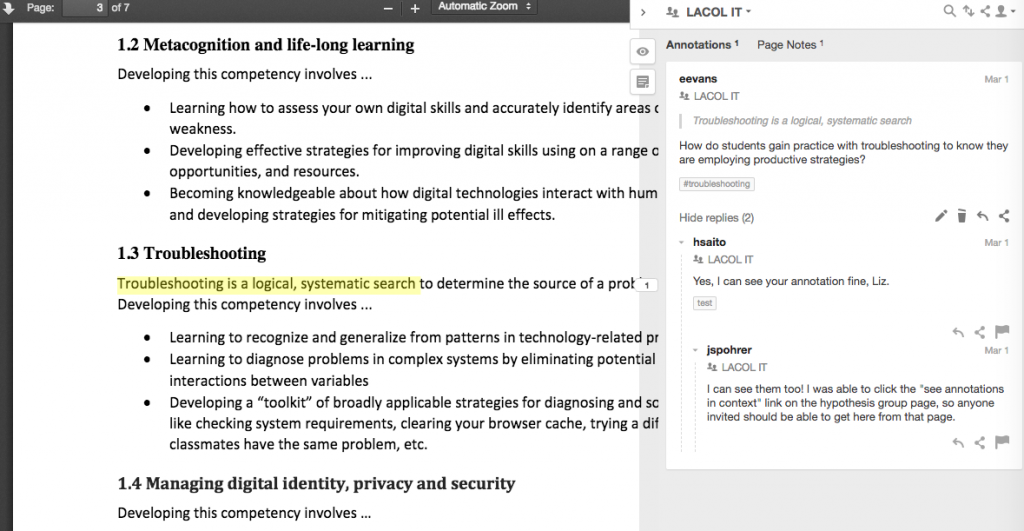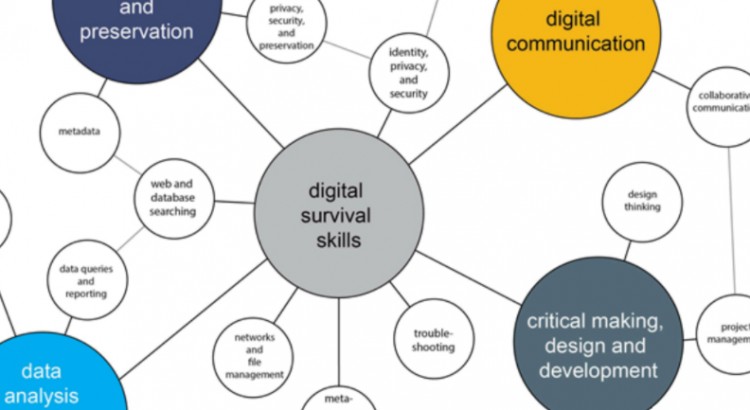The activity described below is linked to the Digital Competencies session at the 2018 LACOL Workshop
The concept of digital competencies (also known as digital fluencies, literacies or dexterities) reflects the need for students to develop digital skills and critical perspectives as lifelong learners prepared for scholarship, work and life in the 21st century. Recently, Bryn Mawr College has developed a digital competencies framework focused on these five areas:
- Digital Survival Skills
- Digital Communication
- Data Management and Preservation
- Data Analysis and Presentation
- Critical Design, Making, and Development
Bryn Mawr’s framework served as the basis for the excellent Think Tank on Digital Competencies last fall at Davidson College which attracted a vibrant group of faculty, librarians and technologists from across the liberal arts.
Digital Competencies Session at the LACOL Summer Workshop
For faculty and staff across LACOL to build upon foundations laid at the Think Tank, an interactive session exploring digital competencies across the curriculum will be held at the 2018 Summer Workshop. This discussion will focus on how digital competencies connect with faculty priorities and practices for teaching and learning in the physical and virtual classroom, and how digital competencies support and relate to higher order learning goals.
Pre-Workshop Activity – Group Annotation of the BMC Framework
As input to the workshop discussion, we are inviting groups of faculty, staff and students to annotate a copy of the Bryn Mawr Digital Competencies Framework using a collaborative annotation tool called Hypothesis. This tool is easy to use and allows everyone in a group to add and comment on annotations overlayed on top of any web document through a shared view. Shared annotation for the BMC Framework can help to reveal key trends and themes that will serve as a starting point for face to face discussion at the workshop.
Annotation Prompts by Group
| Faculty Group Faculty from all LACOL schools, especially those who participated in the October Think Tank and/or will be attending the Summer Workshop, are invited to collaboratively annotate a copy of the Bryn Mawr Framework. As you annotate, consider the prompts below.Faculty prompts:
Academic Staff Group Academic resource colleague prompts:
Student Group Student prompts:
|
Instructions for Annotation in Hypothesis
The Hypothesis annotation tool adds a “conversation layer” on top of any web document. Members of a group can highlight, comment and discuss any piece of text on the page.
Step 1:Set up Hypothesis (for first time users)
To use Hypothesis, you will need to 1) create a free account, and 2) install a browser extension in Chrome or your browser of choice.
Follow the easy, step-by-step instructions here:
https://web.hypothes.is/start/
Step 2: Join a LACOL group for annotating the BMC Framework
Once the Hypothesis browser extension is installed, click the link to join the LACOL group. In order to see the annotation options, you will need to activate Hypothesis in your browser window by clicking the icon in your browser address bar.
FACULTY GROUP LINK: https://hypothes.is/groups/YEKvLkad/lacol-faculty
ACADEMIC STAFF GROUP LINK: https://hypothes.is/groups/Rv8yk6gD/lacol-it
STUDENT GROUP LINK: https://hypothes.is/groups/QdJKM8WV/lacol-students
Here is the location of the BMC Framework PDF to annotate in Hypothesis: https://repository.brynmawr.edu/cgi/viewcontent.cgi?article=1002&context=oer

Hypothes.is annotation in action




